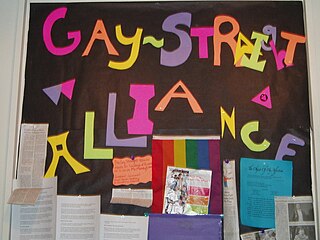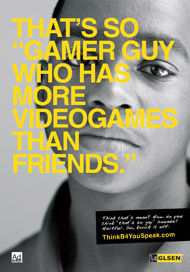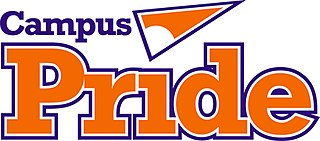Related Research Articles
Gay bashing is an attack, abuse, or assault committed against a person who is perceived by the aggressor to be gay, lesbian, bisexual, transgender or queer (LGBTQ+). It includes both violence against LGBT people and LGBT bullying. The term covers violence against and bullying of people who are LGBT, as well as non-LGBT people whom the attacker perceives to be LGBT.
GLSEN is an American education organization working to end discrimination, harassment, and bullying based on sexual orientation, gender identity and gender expression and to prompt LGBT cultural inclusion and awareness in K-12 schools. Founded in 1990 in Boston, Massachusetts, the organization is now headquartered in New York City and has an office of public policy based in Washington, D.C.

A gay–straight alliance, gender–sexuality alliance (GSA) or queer–straight alliance (QSA) is a student-led or community-based organization, found in middle schools, high schools, colleges, and universities. These are primarily in the United States and Canada. Gay–straight alliance is intended to provide a safe and supportive environment for lesbian, gay, bisexual, transgender, and all LGBTQ+ individuals, children, teenagers, and youth as well as their cisgender heterosexual allies. The first GSAs were established in the 1980s. Scientific studies show that GSAs have positive academic, health, and social impacts on schoolchildren of a minority sexual orientation and/or gender identity. Numerous judicial decisions in United States federal and state court jurisdictions have upheld the establishment of GSAs in schools, and the right to use that name for them.

LGBTQ culture is a culture shared by lesbian, gay, bisexual, transgender, and queer individuals. It is sometimes referred to as queer culture, while the term gay culture may be used to mean either "LGBT culture" or homosexual culture specifically.
The origin of the LGBT student movement can be linked to other activist movements from the mid-20th century in the United States. The Civil Rights Movement and Second-wave feminist movement were working towards equal rights for other minority groups in the United States. Though the student movement began a few years before the Stonewall riots, the riots helped to spur the student movement to take more action in the US. Despite this, the overall view of these gay liberation student organizations received minimal attention from contemporary LGBT historians. This oversight stems from the idea that the organizations were founded with haste as a result of the riots. Others historians argue that this group gives too much credit to groups that disagree with some of the basic principles of activist LGBT organizations.
COLAGE is an organization created in 1990 by the children of several lesbian and gay parents and guardians who felt a need for support.
Ally Week is a national youth-led effort encouraging students to be allies with the LGBT members of their community in standing against bullying and harassment. It takes place in K-12 schools and colleges. It is led in the same spirit as Day of Silence: to educate on anti-LGBT harassment issues. Ally Week is usually held in September or October.

The Think Before You Speak campaign is a television, radio, and magazine advertising campaign launched in 2008 and developed to raise awareness of the common use of derogatory vocabulary among youth towards lesbian, gay, bisexual, transgender, queer/questioning (LGBTQ) people. It also aims to "raise awareness about the prevalence and consequences of anti-LGBTQ bias and behaviour in America's schools." As LGBTQ people have become more accepted in the mainstream culture, more studies have confirmed that they are one of the most targeted groups for harassment and bullying. An "analysis of 14 years of hate crime data" by the FBI found that gays and lesbians, or those perceived to be gay, "are far more likely to be victims of a violent hate crime than any other minority group in the United States". "As Americans become more accepting of LGBT people, the most extreme elements of the anti-gay movement are digging in their heels and continuing to defame gays and lesbians with falsehoods that grow more incendiary by the day," said Mark Potok, editor of the Intelligence Report. "The leaders of this movement may deny it, but it seems clear that their demonization of gays and lesbians plays a role in fomenting the violence, hatred and bullying we're seeing." Because of their sexual orientation or gender identity/expression, nearly half of LGBTQ students have been physically assaulted at school. The campaign takes positive steps to counteract hateful and anti-gay speech that LGBTQ students experience in their daily lives in hopes to de-escalate the cycle of hate speech/harassment/bullying/physical threats and violence.
Research has found that attempted suicide rates and suicidal ideation among lesbian, gay, bisexual, and transgender (LGBTQ) youth are significantly higher than among the general population.

Campus Pride is an American national nonprofit 501(c)(3) organization founded by M. Chad Wilson, Sarah E. Holmes and Shane L. Windmeyer in 2001 which serves lesbian, gay, bisexual and transgender (LGBT) and ally student leaders and/or campus organization in the areas of leadership development, support programs and services to create safer, more inclusive LGBT-friendly colleges and universities.
Youth pride, an extension of the Gay pride and LGBT social movements, promotes equality amongst young members of the Lesbian, Gay, Bisexual, Transgender, Intersex, and Queer (LGBTIQ+) community. The movement exists in many countries and focuses mainly on festivals and parades, enabling many LGBTIQ+ youth to network, communicate, and celebrate their gender and sexual identities.
The Spectrum Center is an office at the University of Michigan in Ann Arbor that is dedicated to providing education, outreach, and advocacy for the lesbian, gay, bisexual, transgender, queer, and allied (LGBTQA) community. Since the organizations' creation in 1971, the Spectrum Center's mission statement has been to "enrich the campus experience and develop students as individuals and as members of the LGBTQA community." The organization achieves this through student-centered education, outreach, advocacy and support.

Historically speaking, lesbian, gay, bisexual, and transgender (LGBTQ) people have not been given equal treatment and rights by both governmental actions and society's general opinion. Much of the intolerance for LGBT individuals come from lack of education around the LGBT community, and contributes to the stigma that results in same-sex marriage being legal in few countries (31) and persistence of discrimination, such as in the workplace.
galck+, formerly The Gay and Lesbian Coalition of Kenya (GALCK), is the national Sexual Orientation Gender Identity and Expression (SOGIE) umbrella body, representing LGBTQ+ voices across Kenya.

The following outline offers an overview and guide to LGBTQ topics:
In the United States, LGBT youth of colour are marginalized adolescents in the LGBT community. Social issues include homelessness; cyberbullying; physical, verbal and sexual abuse; suicide; drug addiction; street violence; immigration surveillance; engagement in high-risk sexual activity; self-harm, and depression. The rights of LGBT youth of colour are reportedly not addressed in discussions of sexuality and race in the larger context of LGBT rights.
LGBTQ psychology is a field of psychology of surrounding the lives of LGBTQ+ individuals, in the particular the diverse range of psychological perspectives and experiences of these individuals. It covers different aspects such as identity development including the coming out process, parenting and family practices and support for LGBTQ+ individuals, as well as issues of prejudice and discrimination involving the LGBTQ community.
The Boston Alliance of Gay, Lesbian, Bisexual, and Transgender Youth (BAGLY) is a non-profit organization located in Boston that works to protect, expand, and raise awareness for the rights of gay, lesbian, bisexual, transgender, queer, and questioning youth (LGBTQ+). Founded by LGBTQ+ youth in 1980, it adopts a youth-led, adult-supported approach to better meet the varied needs of a wide demographic of LGBTQ+ youth in Greater Boston. BAGLY's stated goals are to create, sustain, and advocate for socially just and intersectional programs, policies, and services for the LGBTQ+ youth community, which they achieve through frequent community-based leadership development, health promotion, and social support programs.